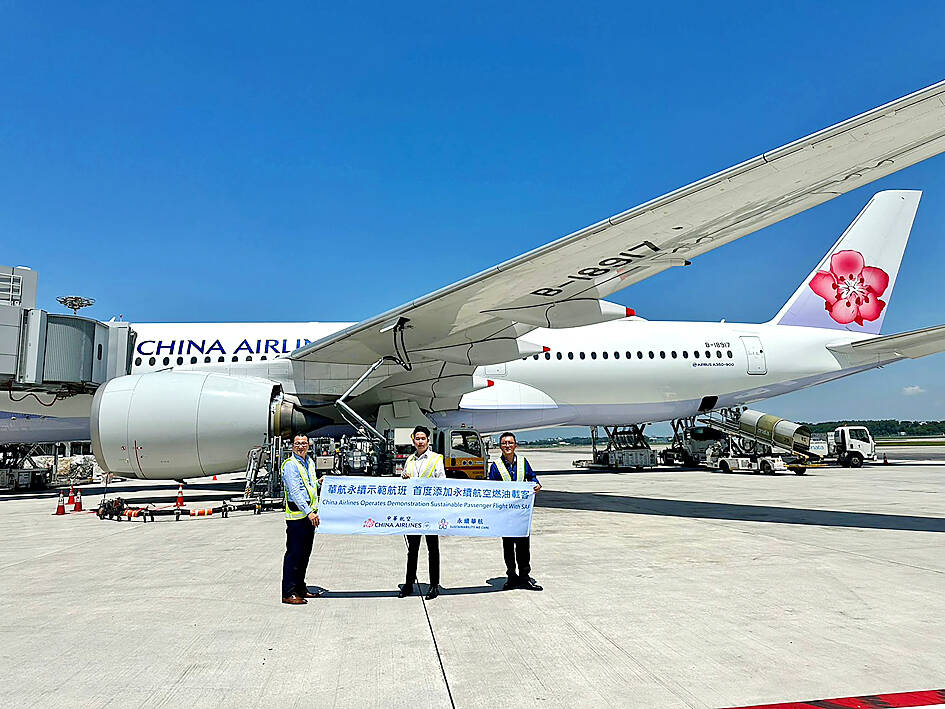China Airlines Ltd (CAL, 中華航空) yesterday launched its first passenger flight from Taipei to Singapore using sustainable aviation fuel, as the carrier aims to reduce carbon emissions despite higher costs.
The airline said it used 10 percent sustainable aviation fuel (SAF), which is made from renewable waste and residue materials such as cooking oil, and 90 percent traditional jet fuel for the flight.
As SAF generates 80 percent less carbon emissions than fossil jet fuel, CAL strategic planning department general manger James Chung (鍾人傑) said yesterday’s flight reduced carbon emissions by 8 percent.

Photo courtesy of China Airlines Ltd
The airline has used SAF for cargo flights for several years, but yesterday’s flight was its first passenger flight, as the Civil Aeronautics Administration is more cautious about airlines using the fuel than its foreign counterparts, Chung said.
The International Air Transport Association has tested a combination of 50 percent SAF and 50 percent fossil jet fuel, and found that it is safe, he said.
The European Council has mandated that all aviation fuel suppliers provide fuel containing at least 2 percent SAF by 2025, Chung said.
However, it is unlikely that the airline would use 100 percent SAF for passenger flights, as it is double the cost of traditional jet fuel and lacks sufficient domestic supply, he said.
“For a mid-haul flight from Taipei to Singapore, it costs us about US$10,000 more to use the 10 percent SAF, which is not particularly high, but if we use 100 percent SAF, the additional expense would be US$100,000,” Chung said.
The extra cost of using SAF would affect ticket prices, he said, adding that the airline would prefer to raise the proportion of SAF gradually.
The government should set up a policy to develop a domestic supply chain of SAF, and make it accessible to all airlines, he said.

Hon Hai Precision Industry Co (鴻海精密) yesterday said that its research institute has launched its first advanced artificial intelligence (AI) large language model (LLM) using traditional Chinese, with technology assistance from Nvidia Corp. Hon Hai, also known as Foxconn Technology Group (富士康科技集團), said the LLM, FoxBrain, is expected to improve its data analysis capabilities for smart manufacturing, and electric vehicle and smart city development. An LLM is a type of AI trained on vast amounts of text data and uses deep learning techniques, particularly neural networks, to process and generate language. They are essential for building and improving AI-powered servers. Nvidia provided assistance

GREAT SUCCESS: Republican Senator Todd Young expressed surprise at Trump’s comments and said he expects the administration to keep the program running US lawmakers who helped secure billions of dollars in subsidies for domestic semiconductor manufacturing rejected US President Donald Trump’s call to revoke the 2022 CHIPS and Science Act, signaling that any repeal effort in the US Congress would fall short. US Senate Minority Leader Chuck Schumer, who negotiated the law, on Wednesday said that Trump’s demand would fail, while a top Republican proponent, US Senator Todd Young, expressed surprise at the president’s comments and said he expects the administration to keep the program running. The CHIPS Act is “essential for America leading the world in tech, leading the world in AI [artificial

DOMESTIC SUPPLY: The probe comes as Donald Trump has called for the repeal of the US$52.7 billion CHIPS and Science Act, which the US Congress passed in 2022 The Office of the US Trade Representative is to hold a hearing tomorrow into older Chinese-made “legacy” semiconductors that could heap more US tariffs on chips from China that power everyday goods from cars to washing machines to telecoms equipment. The probe, which began during former US president Joe Biden’s tenure in December last year, aims to protect US and other semiconductor producers from China’s massive state-driven buildup of domestic chip supply. A 50 percent US tariff on Chinese semiconductors began on Jan. 1. Legacy chips use older manufacturing processes introduced more than a decade ago and are often far simpler than

Gasoline and diesel prices this week are to decrease NT$0.5 and NT$1 per liter respectively as international crude prices continued to fall last week, CPC Corp, Taiwan (CPC, 台灣中油) and Formosa Petrochemical Corp (台塑石化) said yesterday. Effective today, gasoline prices at CPC and Formosa stations are to decrease to NT$29.2, NT$30.7 and NT$32.7 per liter for 92, 95 and 98-octane unleaded gasoline respectively, while premium diesel is to cost NT$27.9 per liter at CPC stations and NT$27.7 at Formosa pumps, the companies said in separate statements. Global crude oil prices dropped last week after the eight OPEC+ members said they would